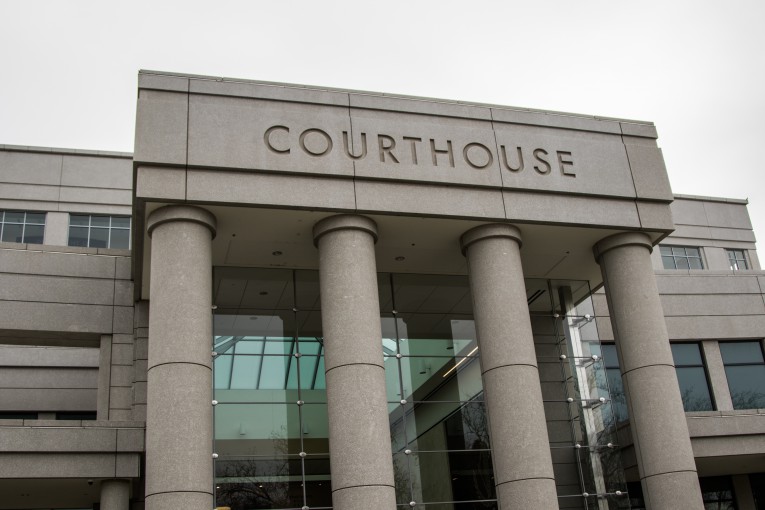

By Jenean Docter
The court reviewed the case of Lorenzo Zamora Torres on the morning of Friday, November 17, 2017, in Department 10. The young man, clad in a UC Davis jacket and glasses, was on probation for his second DUI violation.
The judge presiding over the review was the Honorable Daniel P. Maguire.
The judge asked the People, represented by Deputy District Attorney Jay Linden, if they have received reports of any violations of the SCRAM device for continuous alcohol monitoring that the defendant is required to use as a condition of his probation. The People informed him that they had received an email report from SCRAM indicating that Torres had a positive blood alcohol concentration reading from 12:03 AM to 2:33 AM on July 15, 2017.
Upon reviewing Torres’s case, the judge noted that there existed an active warrant against him, which had been outstanding since July. Since Torres was present, the judge decided to recall the warrant.
As a result of the alleged violation from July, the judge decided not to allow for the immediate removal of the SCRAM ankle bracelet from Torres. Instead, he suggested that Torres continue wearing the bracelet for another year.
The judge received clarification from the People that the SCRAM device indicated an alcohol violation, rather than a tamper violation. The People informed him that the report suggested that 
Torres’s blood alcohol content met the legal requirement for intoxication, 0.08 percent, on July 15.
Since Torres was not facing any additional violations, the judge noted that it would be best for him to continue wearing the SCRAM device for the following year.
Deputy Public Defender John Sage, Torres’s assigned attorney, went outside the courtroom to speak with Mr. Torres, since the defendant may have been unaware that there was an outstanding warrant against him.
Upon returning to the courtroom, Mr. Sage objected strongly to the judge’s suggestion that Torres continue wearing the SCRAM bracelet for another year. He claimed, “He (Mr. Torres) has worn it for over a year; it’s becoming a significant financial hardship for him. Would the Court consider removing it in three months?”
The judge denied Mr. Sage’s request, citing that Torres was on probation for his second DUI violation. Sage passionately objected once more, declaring, “I have a problem with the black box that can’t be argued with.” He then cited cases in which SCRAM bracelets failed to provide an accurate picture of the behavior of those on probation, such as an instance in which one of his clients went to bed wearing socks, and consequently faced a tamper violation.
The judge acknowledged Sage’s comment, and stated that if Torres would explain to him what happened in July, he would compromise and allow him to wear the device for six months, instead of a full year. He maintained that the device is useful in order to “separate out individuals who just can’t stop drinking.”
Torres was sworn in to testify. He claimed that on the night of July 15, he was likely with friends. He noted that sometimes they marinate their food in alcohol, and he argued that he had not been drinking.
The People interjected, stating that “you cannot reach 0.08 based on food alone.”
The judge agreed, and stated that he could not accept Torres’s explanation.
Torres explained that if he had gone out with a friend, he would not have remembered the date. Nonetheless, he avowed that he had not been drinking.
The judge asked Torres if he had received a notification from SCRAM informing him of his alleged violation. Torres replied that he had not received any such notification. He also mentioned that on a Tuesday in July the device was not reading correctly, so he took it to get calibrated. He continued to relate another instance of the device’s alleged unreliability, which occurred in May.
The judge affirmed that he cannot take an admission from Torres because he maintained that he had not been drinking. He noted that a further hearing was necessary in order to properly scrutinize the science and reliability of SCRAM technology, and that it is “not unheard of” to contest SCRAM—a technology which the Court presently relies heavily on in countless cases involving alcohol.
The judge, as stated, recalled the warrant. Another hearing will be held during the first week of January 2018 to investigate the validity of Torres’ claim of innocence against the reigning authority of SCRAM technology. Until then, Torres will continue on probation.

https://www.scramsystems.com/products/scram-continuous-alcohol-monitoring/?gclid=EAIaIQobChMI6Zjh1cXN1wIVBhtpCh0c7Q7wEAAYASAAEgLa6vD_BwE
I think judge Maguire is proceeding in the correct way. A second DUI is very serious and there is every reason to suppose that the defendant is predisposed to drink alcohol. I’m not sure why this case is particularly noteworthy other than to spotlight a technological solution to a social problem. Even if the SCRAM technology shows itself as questionable, I’d rather see an error on the safe side. One DUI is one thing. A second DUI is 10 times worse and public safety outweighs the needs of a proven repeat offender who threatens the health and safety of every one of us.